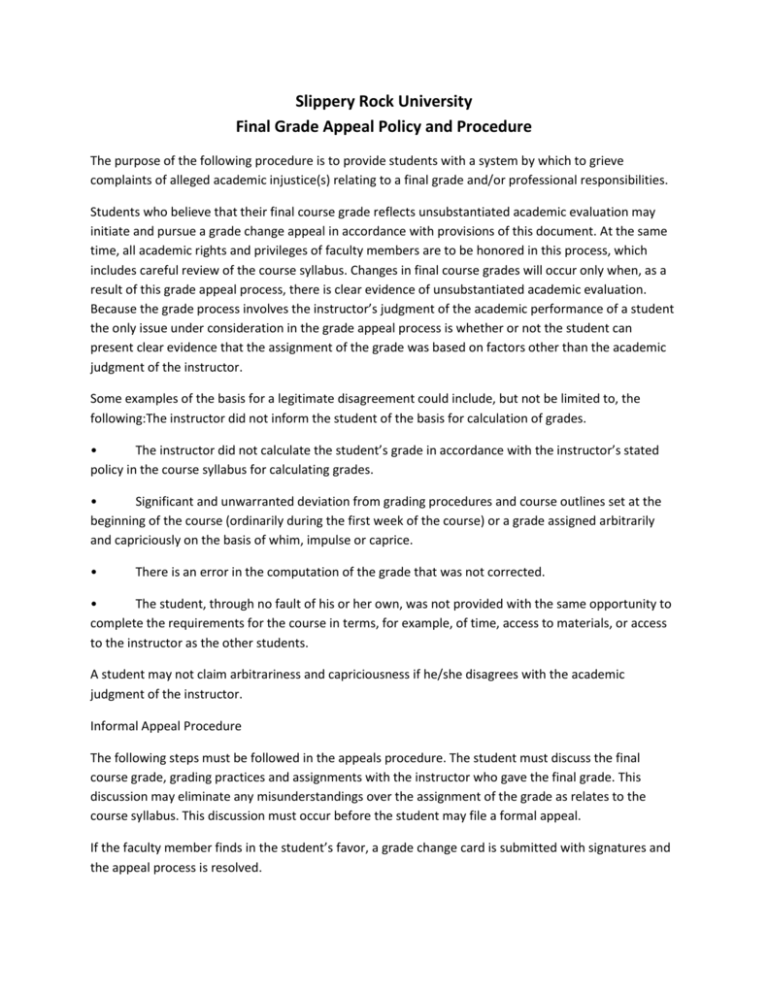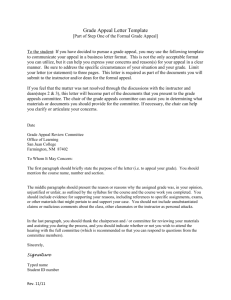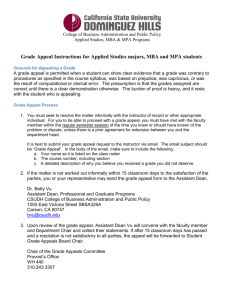Final Grade Appeal Policy and Procedure
advertisement

Slippery Rock University Final Grade Appeal Policy and Procedure The purpose of the following procedure is to provide students with a system by which to grieve complaints of alleged academic injustice(s) relating to a final grade and/or professional responsibilities. Students who believe that their final course grade reflects unsubstantiated academic evaluation may initiate and pursue a grade change appeal in accordance with provisions of this document. At the same time, all academic rights and privileges of faculty members are to be honored in this process, which includes careful review of the course syllabus. Changes in final course grades will occur only when, as a result of this grade appeal process, there is clear evidence of unsubstantiated academic evaluation. Because the grade process involves the instructor’s judgment of the academic performance of a student the only issue under consideration in the grade appeal process is whether or not the student can present clear evidence that the assignment of the grade was based on factors other than the academic judgment of the instructor. Some examples of the basis for a legitimate disagreement could include, but not be limited to, the following:The instructor did not inform the student of the basis for calculation of grades. • The instructor did not calculate the student’s grade in accordance with the instructor’s stated policy in the course syllabus for calculating grades. • Significant and unwarranted deviation from grading procedures and course outlines set at the beginning of the course (ordinarily during the first week of the course) or a grade assigned arbitrarily and capriciously on the basis of whim, impulse or caprice. • There is an error in the computation of the grade that was not corrected. • The student, through no fault of his or her own, was not provided with the same opportunity to complete the requirements for the course in terms, for example, of time, access to materials, or access to the instructor as the other students. A student may not claim arbitrariness and capriciousness if he/she disagrees with the academic judgment of the instructor. Informal Appeal Procedure The following steps must be followed in the appeals procedure. The student must discuss the final course grade, grading practices and assignments with the instructor who gave the final grade. This discussion may eliminate any misunderstandings over the assignment of the grade as relates to the course syllabus. This discussion must occur before the student may file a formal appeal. If the faculty member finds in the student’s favor, a grade change card is submitted with signatures and the appeal process is resolved. If a student and instructor fail to resolve the grade dispute through informal means the student may request a formal grade appeal process by completing a "Final Grade Appeal Form". Formal Appeal Procedure: Step One The student must complete and submit the "student" portion of the Final Grade Appeal Form to the course instructor no later than 15 working days after the beginning of the semester following the issuance of the final grade. The summer term does not constitute a semester. The student must retain a copy of the Final Grade Appeal Form for his/her records and send a copy to the chairperson (or substitute) of the department in which the course is housed. The chairperson of the department evaluation committee shall substitute for the department chairperson IF the department chairperson was the instructor of the course in which the grade is being appealed. Step Two The department chairperson (or substitute) notifies the instructor in writing that chairperson is aware that the instructor has received a grade appeal. If the instructor decides that the final grade is correct, he/she must complete the "instructor" portion of the Final Grade Appeal Form, and return it to the student and send a copy to the chairperson (or substitute) within 10 working days of receipt of the student’s appeal. If an instructor fails to respond within the allotted time, the appeal shall move to step 3 below. If a faculty member whose grade(s) are being appealed is no longer employed by the university or is unavailable due to a sabbatical, sick leave, or other reasons during the time period allotted for the appeal process, the appeal should be directed to the chair of the department (or substitute) for review. Step Three If the student wishes to appeal further, he/she must submit the original Final Grade Appeal Form (or copy if the instructor fails to respond as described in step 2 above) to the department chairperson (or substitute) and college dean. This appeal must be submitted within 10 working days of the dated instructor’s response, or if the instructor does not respond, within 15 working days after the appeal was originally filed with the instructor. The department chairperson (or substitute) will review the appeal within 10 working days. Before the department chairperson (or substitute) determines if the student’s complaint provides evidence that the instructor’s assignment of the grade was based on factors other than the academic judgment of the instructor he/she will review the appeal with the instructor. The chairperson (or substitute) may also conduct whatever informal investigation seems necessary and should attempt to achieve a negotiated settlement. A. When Chair Agrees Grade Is Correct If the department chairperson (or substitute) determines the student’s evidence does not meet the criteria for a grade appeal, the chairperson (or substitute) will forward his/her decision on the grade appeal to the instructor, student, and college dean. B. When Chair Disagrees that Grade Is Correct If the department chairperson (or substitute) determines the student’s evidence does meet the criteria for a grade appeal, he/she will offer an explanation on the Final Grade Appeal Form and provide a copy to the instructor. The instructor must then indicate on the Final Grade Appeal Form whether he/she agrees or disagrees with the chairperson’s recommendation, signs and returns the Final Grade Appeal Form to the chairperson within 5 working days. 1. If the instructor amends the grade, a signed grade change card is submitted and the grade appeal is ended. 2. If the instructor does not agree to amend the grade or fails to respond in the allotted time, the chairperson (or substitute) submits the Final Grade Appeal Form to the college dean, student, and instructor with his/her recommendation within 5 working days. Step Four A. If the dean, upon review of the chairperson’s recommendation, also determines the student’s evidence does not meet the criteria for a grade appeal, the dean will complete and return the Grade Appeal Form to the student with a copy to the instructor and chairperson (or substitute) within 5 working days. The grade appeal process ends. B. If the dean, upon review of the chairperson’s recommendation, determines that the evidence is unclear or the student’s evidence does meet the criteria for a grade appeal, the dean shall initiate a meeting with the faculty member. The dean shall review the appeal, can hear evidence by each side, and may collect further evidence as needed. If agreement cannot be reached, the dean will forward the Final Grade Appeal Form to the Provost within 20 working days, with his/her recommendation that the grade appeal be referred to a Grade Appeal Board. The dean also forwards a copy of the Final Grade Appeal Form to the student, instructor, and chairperson. In each of the above statements, the chairperson of the department evaluation committee shall substitute for the department chairperson IF the department chairperson was the instructor of the course in which the grade is being appealed. Should the chair of the evaluation committee not be available, APSCUF will be consulted in the process of choosing the substitute. Step Five A. Composition of Grade Appeal Board selected by APSCUF. One from the academic department in which the course is taught. Not the instructor. taught. rnment Association. A senior outside the department in which the course is taught. Normally, each Grade Appeal Board will be appointed to hear one appeal. Those responsible for recommending board members should be sensitive to race and gender composition. The Provost will appoint each board and chairperson within the parameters above. B. Grade Appeal Board Procedures Once the appeal board has been established, the appointed chairperson of the committee will contact board members, the faculty member, and the student bringing forth the appeal to determine a date to convene the board (within 20 working days) and send them a letter confirming the date and place of the meeting. At this point, all paperwork and collected evidence will be copied and provided to the members of the appeal board committee in sealed, confidential envelopes. This paperwork and evidence will be assembled by the dean of the college involved in the appeal, reviewed and brought by appeal board members to the appeal meeting. The chair will collect the copies at the end of the meeting. The procedure for the appeal meeting is as follows: 1. The chairperson of the Grade Appeal Board will call the meeting to order and review procedure. 2. The student will have 10 minutes to present his/her reason for the appeal. 3. The faculty member will then have 10 minutes to explain why he/she feels there is no basis for the appeal. 4. The committee members can then ask questions of the student and/or faculty member to clarify any points. 5. The faculty member and the student are excused and told they will be notified of the decision by letter. 6. The committee discusses and reaches a recommendation by majority vote. 7. The chairperson will notify the President of the University of the recommendation of the committee by memo.The chairperson will notify the student and faculty member of the president’s decision by letter. The letter will be copied to the Department Chair and Dean. Step Six Students who appeal a grade to a Grade Appeal Board are responsible for maintaining ALL written materials relevant to the appeal, such as papers, examinations, and completed assignments. Further, the appeals board must have access to appropriate documentation and academic records pertaining to the course grade in question. After the appeals process is complete, the only record to be maintained will be the student’s final grade. Each appeals board will make its recommendation to the university president, who may accept or reject the recommendation. Since the university president has the power and duty to direct the activities of the institution, nothing in this policy should be construed as to diminish that authority in any way. Presented to Academic Affairs Executive Council, September 27, 2011 Presented at Meet and Discuss, October 5, 2011 Approved at President’s Cabinet on October 10, 2011









